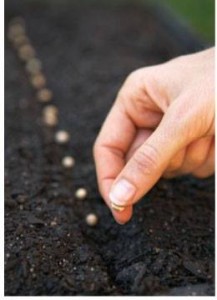-be directly sown into the garden. Direct sowing is a great way to avoid transplant shock. It takes less work but involves more risk from weather, pests, diseases and erosion. Before sowing seeds directly into the garden, know what conditions are required for germination and growth. A warm-season crop, such as beans, may rot before germinating if planted in cold, damp soil. Knowing the average frost date for your area helps to avoid losing frost-sensitive plants. Some cool-season crops, such as peas and lettuce, should be planted early in the season while temperatures are low.
Sow seeds in a row or broadcast them into a well-raked seedbed. Choose a calm day. To broadcast seeds, merely scatter them over a large area in the seedbed. Cover the seeds with a fine layer of soil. To sow very small seeds, mix them with sand before scattering. Then water with a gentle spray. Avoid washing seed away when watering.
